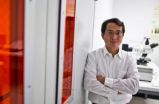(Press-News.org) Scientists have unravelled the shape of the protein that gives human tissues their elastic properties in what could lead to the development of new synthetic elastic polymers.
University of Manchester researchers, working with colleagues in Australia and the United States, used state-of-the-art techniques to reveal the structure of tropoelastin, the main component of elastin.
Elastin allows tissues in humans and other mammals to stretch, for example when the lungs expand and contract for respiration or when arteries widen and narrow over the course of a billion heart beats.
The study, published in the science journal PNAS (March issue), revealed how evolution has triumphed where engineering has so far failed by generating a molecule with near-perfect elasticity that will last a lifetime.
"All mammals rely on elastin to provide their tissues with the ability to stretch and then return to their original shape," said researcher Dr Clair Baldock, from the University of Manchester's Wellcome Trust Centre for Cell Matrix Research. "This high level of physical performance demanded of elastin vastly exceeds and indeed outlasts all human-made elastics.
"It is the co-ordinated assembly of many tropoelastins into elastin that gives tissues their stretchy properties and this exquisite assembly helps to generate elastic tissues as diverse as artery, lung and skin.
"We discovered that tropoelastin is a curved, spring-like molecule with a 'foot' region to facilitate attachment to cells. Stretching and relaxing experiments showed that the molecule had the extraordinary capacity to extend to eight-times its initial length and can then return to its original shape with no loss of energy, making it a near-perfect spring."
She added: "Elastics are used in applications as diverse as clothing, vehicles, tissue engineering and even space travel, so understanding how the structure of tropoelastin creates its exceptional elastic properties will hopefully enable the development of synthetic 'elastin-like' polymers with potentially wide-ranging applications and benefits."
Initiator and research project leader Tony Weiss, Professor in the School of Molecular Bioscience, The University of Sydney, added: "Tropoelastin is a tiny protein 'nanospring' in the human body. Our bodies assemble these nanosprings to put elasticity into tissues like skin, blood vessels and lung.
"Our finding is the result of more than a decade of international collaboration. Our scientific teamwork spans Australia, the UK, USA and Europe. Tropoelastin's extraordinary capacity to extend to eight-times its initial length and then return to its original shape, with no loss of energy, is nature showing us how to make an ideal nanospring."
###
Notes for editors:
A copy of the paper, 'Shape of tropoelastin, the highly-extensible protein that controls human tissue elasticity,' is available on request.
END
A spongy substance that could be mistaken for packing material has the nanotechnology world buzzing.
University of Central Florida Associate Professor Lei Zhai and postdoctoral associate Jianhua Zou have engineered the world's lightest carbon material in such a way that it could be used to detect pollutants and toxic substances, improve robotic surgery techniques and store energy more efficiently.
The new material belongs to the family of the lightest solid, also known by its technical name of aerogel or its common nickname of "frozen smoke."
Zhai's team worked with ...
AMES, Iowa – Invasive plant species have long had a reputation as being bad for a new ecosystem when they are introduced.
Stan Harpole, assistant professor of ecology, evolution and organismal biology at Iowa State University, is founding organizer of a team of more than 70 researchers working at 65 sites worldwide that tested that assumption.
They wanted to know if it is true that problematic invasive species often spread widely in their new habitats because they don't encounter predators or diseases that help keep them in check in their home ranges.
"There is this ...
Robotic surgery offers the same or better results than minimally invasive laparoscopic procedures for treating kidney disease, and can potentially help more patients because it is not as difficult for surgeons to learn, according to a new study led by Henry Ford Hospital specialists.
The findings come at a time both when chronic kidney disease is becoming more common, and while occult – or hidden – damage to kidney function has been overlooked in more than a fourth of patients with small kidney tumors, according to earlier studies.
This chronic renal insufficiency – ...
This release is available in French.
Montreal, March 1, 2011 – Although Edith Piaf defiantly sang, "Non, je ne regrette rien," most people will have their share of regrets over their lifetime. Indeed, anyone who seeks to overcome disappointments should compare themselves to others who are worse off – rather than looking up to folks in more enviable positions – according to a new study from Concordia University. Published in the journal Personality and Social Psychology Bulletin, these findings have implications for both young and old.
"Our study examined how younger ...
ATLANTA –March 1, 2011 – A new report from the American Cancer Society says a large proportion of the 141,000 cases and 49,000 deaths from colorectal cancer expected in the United States this year could be prevented by increasing the use of established screening tests and by applying existing knowledge about colorectal cancer prevention. The report, Colorectal Cancer Facts & Figures 2011-2013, released during National Colon Cancer Awareness Month, notes there has been substantial progress in the last decade reducing colorectal cancer incidence and death rates in most population ...
Minneapolis/St. Paul (Mar. 1, 2011) – A five-year clinical trial led by University of Minnesota Medical School researchers has led to a new method of cardiopulmonary resuscitation (CPR) that improves long-term survival rates with good brain function by 50 percent.
The new technique goes beyond the standard hands-only compression-decompression method to include to two devices that increase blood circulation. Researchers found that the new device combination caused the heart and brain to receive nearly three times more blood flow during each compression-decompression ...
ANN ARBOR, Mich. — Recent research suggests vitamin D may be able to stop or prevent cancer. Now, a new study finds an enzyme that plays a role in metabolizing vitamin D can predict lung cancer survival.
The study, from researchers at the University of Michigan Comprehensive Cancer Center, suggests that this enzyme stops the anti-cancer effects of vitamin D.
Levels of the enzyme, called CYP24A1, were elevated as much as 50 times in lung adenocarcinoma compared with normal lung tissue. The higher the level of CYP24A1, the more likely tumors were to be aggressive. About ...
University Park, Pa. -- Free time is not always a fun time for people with autism. Giving them the power to choose their own leisure activities during free time, however, can boost their enjoyment, as well as improve communication and social skills, according to an international team of researchers.
"For many of us, we look at recreation as a time to spend on activities that are fun and that are designed for our enjoyment," said John Dattilo, professor, recreation, park and tourism management, Penn State. "But for some people with disabilities, particularly those who ...
A new review published in WIREs Nanomedicine and Nanobiotechnology explores how nanotechnology may provide powerful new tools that could have a marked impact on the therapeutic and diagnostic measures available to surgeons.
Nanotechnology uses very small objects—billionths of a meter—to achieve tasks that would be difficult at larger scales. Nanodevices travel relatively freely throughout the body and can enter cells, making them useful for drug delivery, or mimic the features of the environment outside cells, making them useful for tissue engineering.
Their very properties ...
Researchers have over time been able to show that medicine designed at nanoscale offers unprecedented opportunities for targeted treatment of serious diseases such as cancer. However, now research also shows that the body's immune system plays a significant part in the drug delivery process.
"Researchers today are able encapsulate medicine in nanoparticles the size of viruses. The nanoparticles are effective for drug delivery – the delivery of the medicine to the body – because they can very precisely find diseased cells and carry the medicine to them. This means that ...


